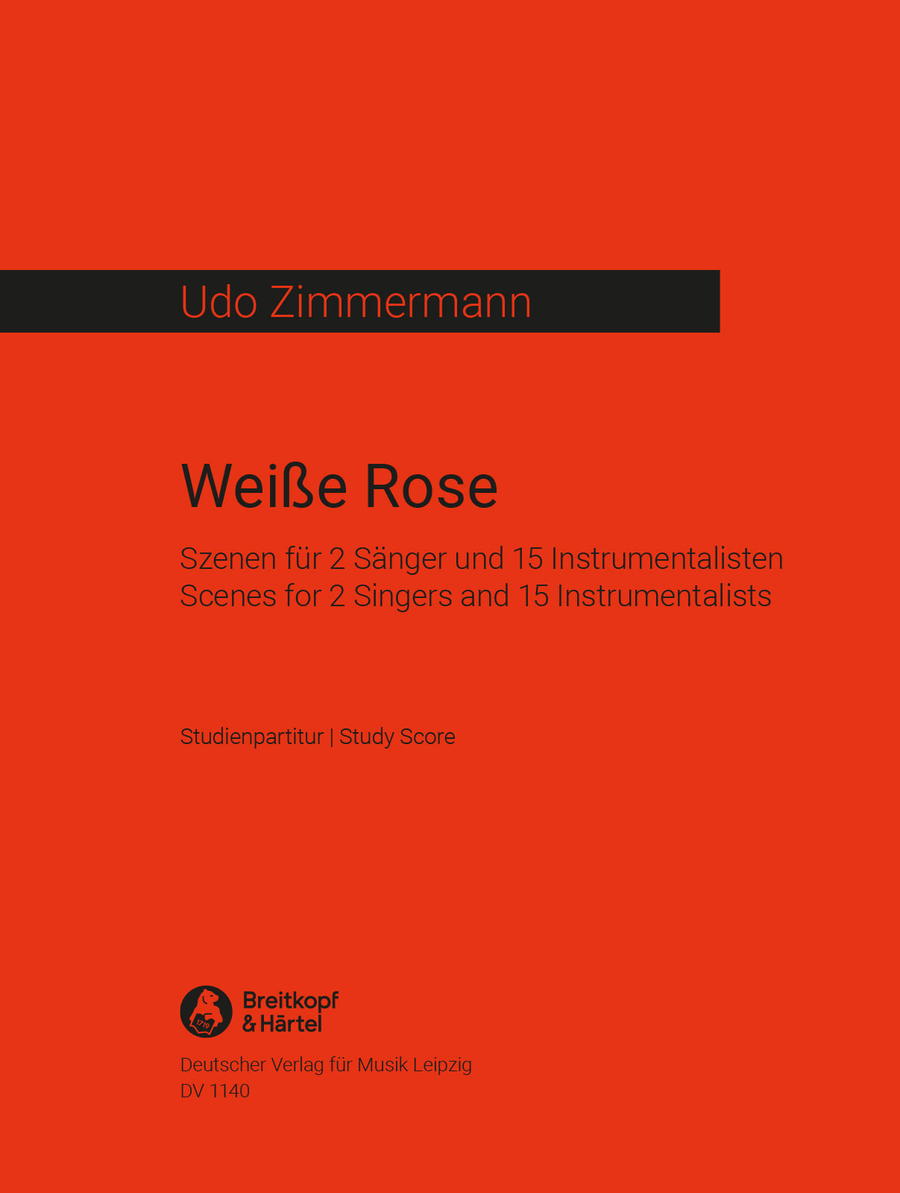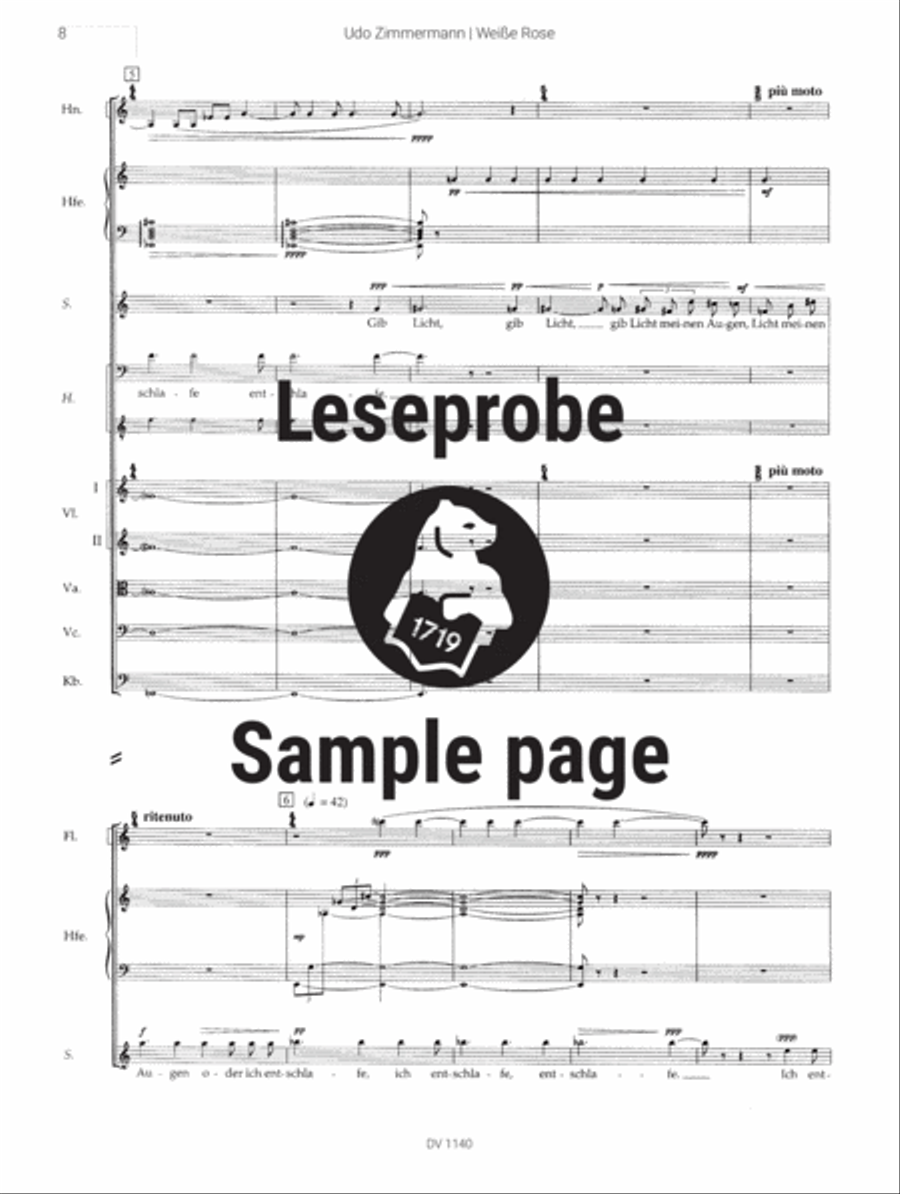Details
SKU: BR.DV-1140-07
Scenes for 2 Singers and 15 Instrumentalists. Composed by Udo Zimmermann. Voice; Softbound. Deutscher Verlag.World premiere: Hamburg, February 27, 1986The study score has been awarded the German Music Edition Prize.
Opera; Music theatre; Music post-1945; New music (post-2000). Study Score. Composed 1984/85. 132 pages. Duration 75'. Deutscher Verlag fur Musik #DV 1140-07. Published by Deutscher Verlag fur Musik (BR.DV-1140-07).ISBN 9790200411362. 6.5 x 9.5 inches.
Text by Wolfgang Willaschek
Translation: Engl. (S. Wadsworth) (1988) / (Norbert Rubesaat) (1993);
French (Jean-Pierre Wurtz) (1997)
Place and time: Jail Munchen-Stadelheim, in the hour before the execution on 22nd February 1943
Characters: Sophie Scholl (soprano) / Hans Scholl (baritone or tenor)
>>Weisse Rose<< (White Rose) was the name of the resistance group to which Hans and Sophie Scholl belonged.
Udo Zimmermann's composition is characterized by the varying structure of its scenes: dramatic, visionary scenes, e.g. the remembered wartime experiences on the front, Sophie's anxiety about the removal of the children and the wish to see her parents one last time, contrast with contemplative monologues that are intended to provide insights into the individual's particular situation. The composer interweaves into the structure of the piece dream sequences with sudden bursts of anxiety that are not triggered by the execution that is about to take place but by the consequences of one's own actions. The result is a deliberate fusion of the various parts into one another.
More than 100 different productions prove that the topic is as important as ever and that the work is both artistically rewarding and practicable.
Udo Zimmermann About the piece
Two young people, the siblings Sophie and Hans Scholl, are in a prison cell, one hour before they are to be put to death by their fascist executioners. Their christian convictions and sense of responsibility gave them the courage to put up resistance, resistance against the lies, the contempt for humanity and all human values. Sophie and Hans Scholl took their stand in the full knowledge that they were taking a deadly risk. They would simply not have been able to live with their feelings of shame had they not grasped the chance of fighting for what they believed in, even though it was a dangerous thing to do. Memories of past events, doubts, hopes and fears, justification of deeds and an acceptance of death, all these things happen and move in, and between, these two people during this representation of the hour before death. The orchestra provides a psycho-physical shorthand of their inner mental state. Musical effects and gestures search for their identity in human behaviour. The moments of stillness and silence provide moments of musical tension, which are just as powerful as the eruptions of fear and desperation.
CDs:
Gabriele Fontana (soprano), Lutz-Michael Harder (tenor), Instrumentalensemble, cond. Udo Zimmermann
CD Orfeo C 162 871
Grazyna Szklarecka (soprano), Frank Schiller (tenor), musica viva-ensemble dresden, cond. Udo Zimmermann
CD Berlin Classics Eterna BC 0120 060-2
CD (excerpts):
Gabriele Fontana (soprano), Lutz-Michael Harder (tenor), Ein Instrumentalensemble, cond. Udo Zimmermann
CD BMG 74321 73628 2
Bibliography:
Kornel, Attila: ,,Tief unter uns nur Schweigen - Die Asthetik der Stille in Udo Zimmermanns Kammeroper ,,Weisse Rose, in: Die Tonkunst 11 (2017), pp. 368-377.
Rheinlander, Matthias: Im Osten nichts Neues? Ostalgie ohne Kitsch am Beispiel von Udo Zimmermanns Oper Die weisse Rose, in: Musik und Unterricht, Heft 73 (2003), pp. 34-40.






